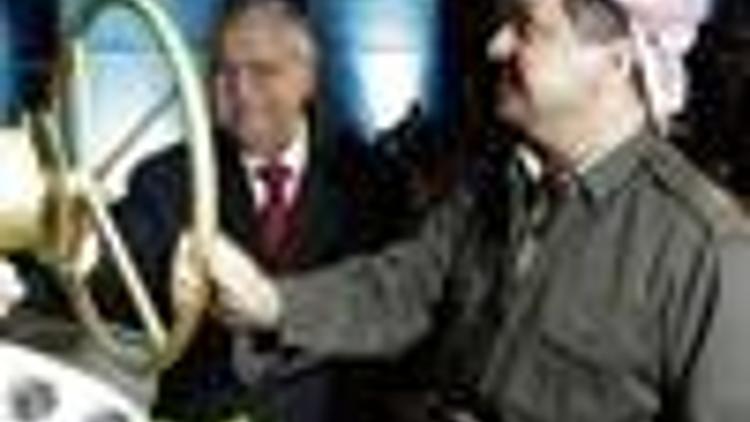Kurdish authority tapping into oil wealth
Güncelleme Tarihi:

ARBIL -The Kurdish administration in northern Iraq and Turkish energy firm Genel Enerji took a historic step by launching oil exports from northern Iraq to Turkey yesterday.
The export of oil from Genel Enerji’s Taq Taq and Tawke oil fields is the first time the Kurdish administration of northern Iraq has exported its oil reserves overseas. The move also reflects the evolution of stronger economic relations between Turkish businesses and the Kurdish administration in northern Iraq, which in Turkey has been criticized for not stamping out more efficiently the presence of outlawed Kurdistan Workers’ Party, or PKK, terrorists in the region.
Nechirvan Barzani, prime minister of the Regional Kurdish Administration in northern Iraq, said the launch of oil exports from northern Iraq marked a "dramatic departure" from Iraq’s recent past. "Previous regimes in Iraq exploited the country’s natural resources without checks and balances on their power. This was used to enable violence and repression," he said in a ceremony marking the occasion in Erbil yesterday. "Economic cooperation within Iraq and across its borders will lay the foundation for a brighter collective future," Barzani said.
"Turkey is our economic partner. We are in a new era of friendship and cooperation, on the right path," Ashti Hawrami, minister for natural resources in the Kurdish administration of northern Iraq said.
Revenue of $5 million a day
Genel Enerji, part of Turkey’s Cukurova Group, is exporting oil from the Taq Taq oil field through the town of Kurmala on to Kirkuk-Ceyhan pipeline. The exporting activity will take place under the scope of Taq Taq Operating Company, or TTOPCO, established as a joint operating company with Canadian-Swiss Addax Petroleum in 2005. Together, the two firms have invested more than $350 million in the exploration and development of oil in northern Iraq. From Tawke, oil exports will also be sent to Turkey through a tie-in pipeline connected to the Kirkuk-Ceyhan line some 50 kilometers from Tawke. Tawke oilfield, where Genel Enerji has a 25 percent stake, is operated by Norwegian petroleum firm DNO.
Exports from Taq Taq will stand at 40,000 barrels per day and from Tawke at 60,000 barrels per day, and bring a total revenue stream of $5 million per day on the basis of per-barrel price of $50. Within a year, oil exports from the two fields are expected to reach 250,000 barrels per day.
Delay with a cost of $10 bln
Although crude oil in the two fields has been ready for export for nearly two years, disagreement between the central government of Iraq and the Kurdish administration delayed the actual beginning of exports. The disagreement focused mainly on the Kurdish administration’s rights to decide on its oil exports independently of the central government.
Hawrami said Article 115 of the Constitution had empowered the Kurdish administration of northern Iraq to manage all new oil fields. "The exploration and production of oil and gas that has led to today’s export is within the terms of the Constitution," he said.
Even with today's low oil prices, the dispute caused delays for oil exports from Iraq costing over $10 billion, Hawrami added. "This must not be repeated. What is needed is a rapid recovery plan based on market-driven policies, and decentralization. Iraq needs to boost exports to at least 5 million barrels per day by the time our region’s production target reaches 1 million barrels per day," Hawrami said.
At today’s oil prices, the new operations will generate $2 billion in revenue within a year, Hawrami noted. "This will increase to $5 billion next year and to a staggering $20 billion in just four years from now. We are a successful example for the rest of Iraq. Today, we show that market-driven policies can aid the country’s recovery."
Iraq has the world's third-largest oil and tenth-largest gas reserves, but needs billions to overhaul its energy infrastructure. Iraq is currently producing only 1.8m barrels per day, far below potential and not enough to meet its reconstruction needs. With the exports from TaqTaq and Tawke oilfields Iraq’s monthly oil exports will increase by 100,000 barrels per day.
Within a year, oil exports from the two fields alone will increase to 250,000 barrels per day. By the end of the next year, Iraq’s oil exports will increase to 450,000 barrels a day, and is likely to reach 1 million barrels a day within four years. This will increase Iraq’s overall oil export by 50 percent from the present level. As other fields in northern Iraq are discovered and developed, the target is to produce 450,000 barrels by 2011, reaching 1m by the end of 2012.

